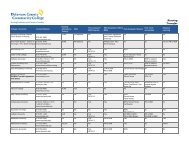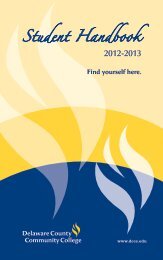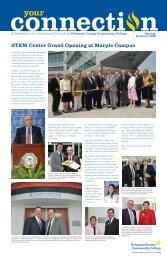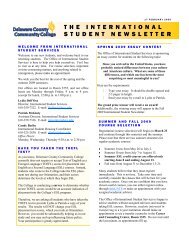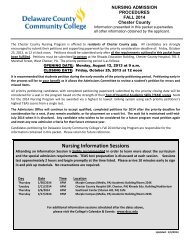2010 Catalog - Delaware County Community College
2010 Catalog - Delaware County Community College
2010 Catalog - Delaware County Community College
You also want an ePaper? Increase the reach of your titles
YUMPU automatically turns print PDFs into web optimized ePapers that Google loves.
COURSE DESCRIPTIONS 81<br />
assistant in the health care delivery system.<br />
• Describe the role of the medical assistant in<br />
assisting with physical measurements.<br />
• Analyze the role of the medical assistant in<br />
assisting the physician with the health history<br />
and physical examination.<br />
• Understand the role of the medical assistant in the<br />
collecting and handling of specimens.<br />
• Analyze the role of the medical assistant in assisting<br />
the physician in minor surgery.<br />
Prereq. AHM 106<br />
1 Credit 2 Weekly Laboratory Hours<br />
AHM 110 Medical Assistant Review<br />
Practicum II<br />
The course prepares students with simulation laboratory<br />
experience in assisting the physician in the clinic, hospital<br />
or private office. Responsibilities include preparation of<br />
the client for examination, measurements of body functions,<br />
aiding in diagnostic tests and procedures, and general<br />
operation of the office.<br />
Upon successful completion of this course the student<br />
will be able to:<br />
• Apply the principles of pharmacology and drug<br />
administration.<br />
• Perform diagnostic laboratory procedures that are<br />
utilized in a physician's office.<br />
• Perform an EKG.<br />
• Describe the role of the medical assistant in assisting<br />
• with physical therapy.<br />
• Evaluate the role of the medical assistant during a<br />
medical emergency and giving first aid.<br />
Prereq. AHM 106 & 107<br />
1 Credit 2 Weekly Laboratory Hours<br />
AHM 130 Medical Coding Concepts<br />
for Allied Health<br />
This course, for non-coding majors, is designed to teach<br />
students general principles of ICD-9-CM (International<br />
Classification of Disease) And CPT-4 (Current Procedural<br />
Terminology) coding. Students will learn to translate<br />
medical terminology and descriptions into code numbers.<br />
In this course will will focus on coding for both inpatient<br />
and outpatient procedures. Emphasis will be placed on<br />
accuracy of coding in a variety of settings.<br />
Upon successful completion of this course, students<br />
should be able to:<br />
• Explain the organization of both the ICD-9-CM manual<br />
and CPT-4 manual.<br />
• Translate descriptions of diagnostic terms and<br />
symptoms into correct ICD-9-CM codes.<br />
• Recognize and use the HCPCS (Health Common<br />
Procedural Coding System) for Medicare patients.<br />
• Describe the DRG system and why it is of importance.<br />
• Convert descriptions of inpatient surgical procedures<br />
into correct ICD-9-CM codes.<br />
• Select valid CPT-4 codes and apply them to outpatient<br />
procedures for laboratory (pathology), diagnostic testing<br />
and outpatient surgical procedures.<br />
• Apply rules and guidelines for selecting the correct ICD-<br />
9-CM and CPT-4 codes.<br />
• Use correct codes relating to health conditions and factors<br />
using "V" codes and "E" codes from the ICD-9-CM Manual.<br />
Prereq. AHM 233<br />
3 Credits 3 Weekly Lecture Hours<br />
AHM 140 Professional and<br />
Communication Issues in Health Care<br />
This course is designed to provide the student with the<br />
knowledge and skills needed to communicate effectively<br />
in the health care setting. Emphasis is on development of<br />
interpersonal skills for workplace and therapeutic<br />
communication. Among the topics covered are basic<br />
communication skills, conflict resolution, cultural<br />
awareness, confidentiality, and professionalism.<br />
Upon successful completion of this course, students<br />
should be able to:<br />
• Apply basic principles of communication in responding<br />
to verbal and nonverbal communication.<br />
• Respond appropriately to issues of confidentiality in the<br />
health care setting.<br />
• Demonstrate knowledge of federal and state health care<br />
legislation and regulations.<br />
• Describe professionalism in relation to the health care setting.<br />
• Explain the role of alternative and complimentary<br />
medicine in health care.<br />
• Develop transcultural communication skills.<br />
3 Credits 3 Weekly Lecture Hours<br />
AHM 185<br />
Medical Office Management<br />
This course is designed to provide the student with an<br />
understanding of how a medical office runs, and the<br />
responsibilities of all staff members. In this course, the<br />
student will learn through a variety of media, how to find<br />
a position in the medical field, a history of medicine,<br />
ethical and legal considerations in medicine as well as<br />
how to handle finances for a medical office/facility.<br />
Upon successful completion of this course, the student<br />
should be able to:<br />
• Describe the ethical and legal responsibilities of a<br />
medical office administrator.<br />
• Demonstrate effective oral and written communication<br />
both with professionals and patients.<br />
• Complete and evaluate third party payer requirements.<br />
• Use and understand systems of maintaining patient<br />
clinical and financial records.<br />
• Perform office tasks appropriate for computer solutions.<br />
• Organize and maintain the physical requirements of a<br />
medical office.<br />
Prereq. AHM 233<br />
3 Credits 3 Weekly Lecture Hours<br />
AHM 199<br />
Medical Assistant Practicum<br />
Selected clinical experiences are provided in a medical<br />
office or health care facility. This is a planned activity that<br />
must be scheduled with the coordinator of the Medical<br />
Assistant program. This course is offered spring, summer<br />
session I and II semesters.<br />
Upon successful completion of this course, students<br />
should be able to:<br />
• Demonstrate an understanding of the anatomical<br />
structure and physiological functioning of the human<br />
body and of medical terms descriptive of body systems.<br />
• Apply the business/administrative and clinical duties of<br />
the medical assistant.<br />
• Function as an assistant to the physician in a medical<br />
and/or other health care setting.<br />
• Implement the ethical and legal responsibilities of the<br />
medical assistant in the health care delivery system.<br />
• Apply selected principles of biophysical and psychosocial<br />
sciences in providing assistance to the physician.<br />
• Maintain business and patient health records.<br />
• Discuss the fundamental concepts of disease<br />
6 Credits<br />
AHM 220<br />
Applied Microbiology<br />
This is a survey course intended for allied health majors.<br />
The concepts of specimen collection and transport, identification<br />
of microorganisms, pathogenesis and control,<br />
and treatment of infectious disease are the main emphasis<br />
of the course. Clinical laboratory experiences will emphasize<br />
application of concepts to skills.<br />
Upon successful completion of this course, students<br />
should be able to:<br />
• Explain the relationship between the structure and<br />
function of microorganisms.<br />
• Describe techniques of microbial control.<br />
• Apply principles of sterile technique in specimen<br />
collection and performing laboratory procedures in the<br />
microbiology lab.<br />
• Describe the distribution of normal and pathogenic flora<br />
for different body sites.<br />
• Discuss antibiotic treatment for disease.<br />
• Classify and perform diagnostic procedures of body<br />
fluid specimens.<br />
1 Credit 2 Weekly Lecture Hours<br />
2 Weekly Laboratory Hours<br />
AHM 230 Introduction to ICD-9-CM<br />
Coding Principles<br />
The International Classification of Disease, 9th Revision,<br />
Clinical Modification (ICD-9-CM) coding system is a medical<br />
classification system used to describe diagnoses and<br />
operative (surgical and invasive) procedures. This course<br />
will teach the student the skills and knowledge necessary to<br />
determine the correct ICD-9-CM diagnosis code based on a<br />
thorough review of the medical docu-mentation. Prospective<br />
payment rates based on diagnosis-related groups (DRG's)<br />
have been established as the basis of payment for Medicare<br />
and other insurers. Proper ICD-9 coding is crucial to the<br />
correct DRG assignment and thus reimbursement.<br />
Upon successful completion of this course, the student<br />
should be able to:<br />
• Understand the format, conventions and characteristics<br />
of ICD-9-CM coding.<br />
• Apply general guidelines and chapter specific guidelines<br />
to correctly assign<br />
• ICD-9-CM codes.<br />
• Understand the application of Official Guidelines for<br />
coding and Reporting.<br />
• Define the steps to diagnosis coding.<br />
• Identify the major elements of the DRG system.<br />
• Understand the code of ethics for coders.<br />
Prereq. AHM 233, AHM 104, AHM 105<br />
3 Credits 3 Weekly Lecture Hours<br />
AHM 231<br />
Introduction to CPT-4<br />
Coding<br />
The primary focus of this course is to provide an<br />
overview of The Current Procedural Terminology (CPT-4)<br />
coding system. CPT is the coding system used to describe<br />
services provided by physicians. CPT is also used for<br />
services provided by hospital outpatient and ancillary<br />
departments, hospital emergency departments, and other<br />
health care facilities. This course also addresses reimbursement<br />
and compliance issues related to physicianbased<br />
coding as well as the use of HCFA Common<br />
Procedural Coding System (HCPCS). Upon successful<br />
completion of this course, the student should be able to:<br />
• Define terms, phrases and abbreviations related to<br />
medical coding.<br />
• Apply Current Procedural Terminology (CPT) coding as<br />
they pertain to<br />
• identification of procedures in medical practices.<br />
• Describe insurance carrier reimbursement systems.<br />
• Apply legal concepts to issues of medical coding.<br />
Prereq. AHM 233, AHM 104, AHM 105<br />
3 Credits 3 Weekly Lecture Hours<br />
AHM 232<br />
Advanced CPT-4 Coding<br />
This course is designed for students who plan to work<br />
in the medical records department of a health care facility.<br />
It is intended to provide additional in depth study of<br />
coding principles, clinical topics, and case studies to<br />
increase knowledge and skills in CPT (Current Procedural<br />
Terminology) coding. The use of HCFA Common<br />
Procedural Coding System (HCPCS) is also addressed.




